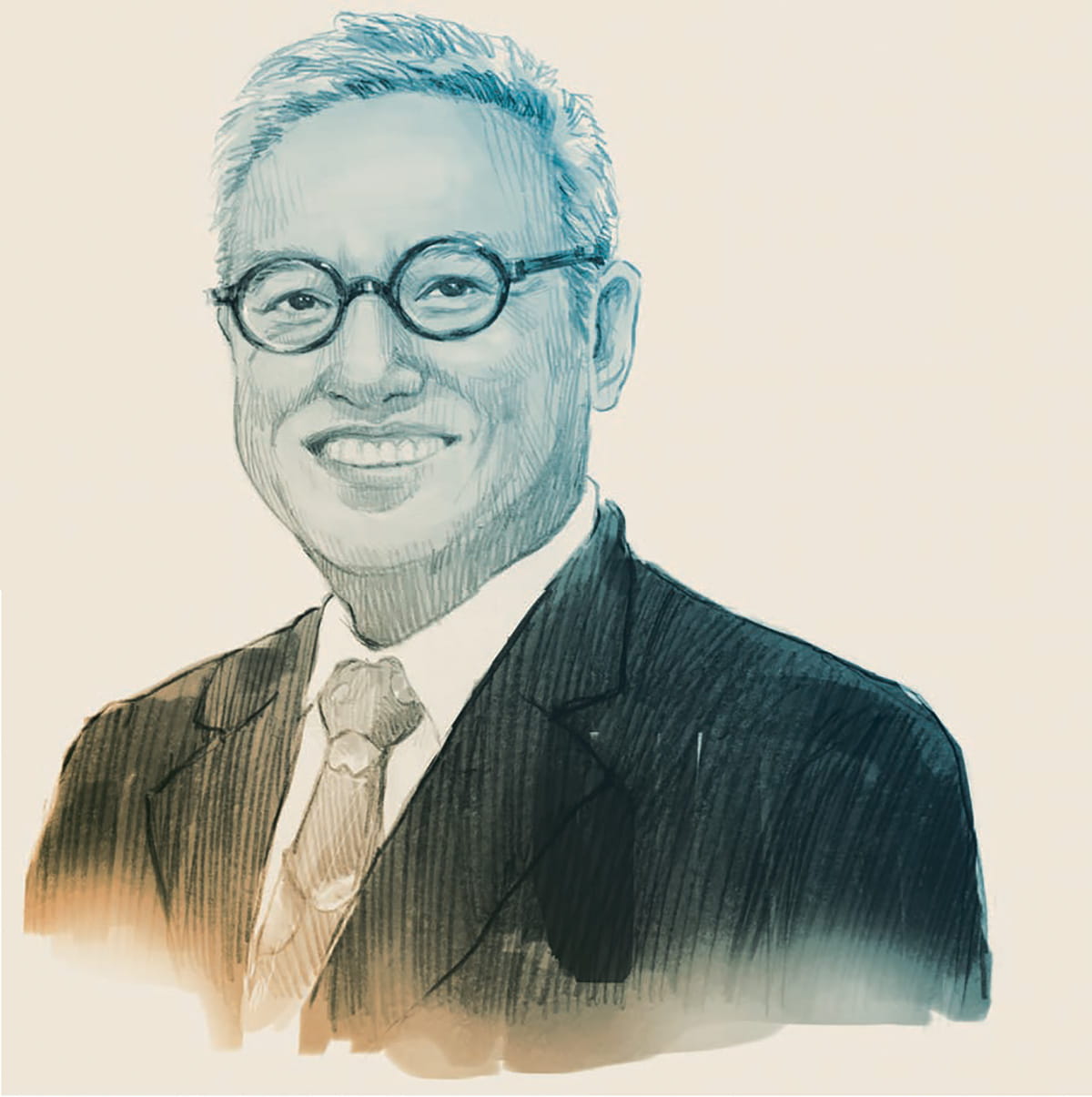Stories > A Stage for Singapore
A Stage for Singapore
ILLUSTRATION THAM SZEMIN

Arts philanthropist Michael Tay, a former ambassador and a former director-general of ASEAN-Singapore, talks about the value of non-traditional diplomacy and how the real agents of change in regional and global processes are people and ideas.
first heard the work of avant-garde composer Vladimir Martynov in 2004, when I was the Singapore ambassador to Russia. Listening to a performance of one of his scores at the City Hall in Moscow, I found his music very moving, and felt he deserved a wider audience. He hadn’t wanted to leave Moscow after the fall of the Soviet Union, and that decision cost him.
I plucked up the courage and asked if he would compose a string-quartet piece for Singapore (that would be affordable and relatively easy for me to stage). He said yes. I invited him to Singapore to meet our ethnic musicians and music lecturers, and to experience Singapore for himself.
After two weeks he came back and said: “It needs to be an orchestral piece. Singapore represents something the Soviet Union could not achieve. The Soviet Union was trying to create utopia on earth, but it failed. Singapore thinks of utopia as the journey, and this is what makes Singapore big. Don’t think of yourself as a small country.”
I was nervous commissioning the piece. Singaporeans are very conservative. But I believe in looking at new ways to do things. I could have chosen a film composer who could have given us an amazing theme track, but I wanted something serious that portrayed us as futuristic. Soft diplomacy is a better way to influence perceptions than overt declarations or actions.
The night before the premiere was the first time I heard the piece. And I just sat there and cried. It was so beautiful. He had even taken phrases from the Chinese philosopher Lao Tze and fused them with Western musical styles. I hadn’t expected the effect it would have in Moscow. It was the first time anyone had commissioned a new symphony in Russia in 20 years. The way they saw it, I was promoting Russia. For six months, I was in newspapers and on magazine covers. It created a lot of buzz for Singapore, which previously didn’t exist to them. And all the journalists wanted to visit Singapore to find out more about the country.
“I Feel That Itʼs Grassroots Initiatives Like Musicians, The Arts, Design, Etc., That Will Truly Magnify Singapore To Everyone”
Michael Tay
The Russian journalists loved Singapore. They couldn’t understand how we had made something out of nothing, how everything worked so well, and how it was so safe. They had everything in their favour - oil and gas, commodities, arts, their mathemathical geniuses and scientists – but didn’t have the security we enjoyed. They saw our women walking along quiet streets alone without worry and were astounded.
From this, I gained the courage something even bigger. I decided to organise the Russia-Singapore Business Singapore in 2006. Singaporean businessmen were then very apprehensive about Russia.
My idea was to show Singaporean business leaders that the Russians were just as young and just as hungry to do business. I made the introductions and they took it from there.
At the second forum in 2007, we had an opening party. I brought a Russian choir to sing with the Singapore Symphony Orchestra and perform SINGAPORE: A Geopolitical Utopia together. Martynov had included lots of trivia about Singapore in the piece, like our 719 sq km area, and how we comprise many nationalities. One of my Russian friends joked afterwards that he would remember Singapore for life because of this.
After I left the government service in 2013, I started the Foundation for The Arts and Social Enterprise to give home-grown talents an international stage. Everyone at the foundation is a volunteer, led by a similar passion. We comprise Singaporeans, Indonesians, Kazakhs, Malaysians, Russians and the Swiss. We have been trying to develop a patronage system. This network of patrons includes Ravi Chidambaram, co-founder of TC Capital, Arthur Chua, CEO of Goldbell, and some of my Russian friends like Evgeny Tugolukov who have made their homes in Singapore and want to give back.
The foundation has also created a third stage for Martynov’s symphony. The London Philharmonic Orchestra a recording of it. Once that happens, it will go to a different level. it won't just be between Russia and Singapore, as the London Philharmonic has its own record label and distribution potential - it will have an international stage, instead of just being shared between two countries.
The arts are important to Singapore as it is the creative dimension that we never really had. We’ve created an amazing country. It has the best infrastructure in the world. But we have reached a point where we are no longer truly innovative - we are all innovative in the same box. Creativity cannot be constructed. It can only be supported. You can create conditions for it, but you've got to let people be and let them grow. You shouldn’t constrain them. It's important to have a more enlightened view of the space that you give your people, in which they can create.
Kids will liberate themselves when they choose to pick up an instrument and play a song, when they want to write music, or form a band with friends. To me, that’s innovation. I feel that it's grassroots initiative like musicians, the arts, design, etc. that will truly magnify Singapore to everyone.
